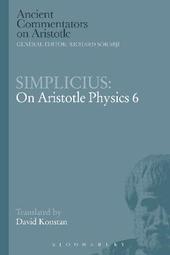
|
Simplicius: On Aristotle Physics 6
Paperback / softback
Main Details
| Title |
Simplicius: On Aristotle Physics 6
|
| Authors and Contributors |
By (author) David Konstan
|
|
Translated by David Konstan
|
| Series | Ancient Commentators on Aristotle |
|---|
| Physical Properties |
| Format:Paperback / softback | | Pages:187 | | Dimensions(mm): Height 234,Width 156 |
|
| Category/Genre | Western philosophy - Ancient to c 500 |
|---|
| ISBN/Barcode |
9781780933658
|
| Classifications | Dewey:185 |
|---|
| Audience | | Tertiary Education (US: College) | |
|---|
|
Publishing Details |
| Publisher |
Bloomsbury Publishing PLC
|
| Imprint |
Bloomsbury Academic
|
| Publication Date |
10 April 2014 |
| Publication Country |
United Kingdom
|
Description
Book Six of Aristotle's Physics, which concerns the continuum, shows Aristotle at his best. It contains his attack on atomism which forced subsequent Greek and Islamic atomists to reshape their views entirely. It also elaborates Zeno's paradoxes of motion and the famous paradoxes of stopping and starting. This is the first translation into any modern language of Simplicius' commentary on Book Six. Simplicius, the greatest ancient authority on Aristotle's Physics whose works have survived to the present, lived in the sixth century A.D. He produced detailed commentaries on several of Aristotle's works. Those on the Physics, which alone come to over 1300 pages in the original Greek, preserve not only a centuries-old tradition of ancient scholarship on Aristotle but also fragments of lost works by other thinkers, including both the Presocratic philosophers and such Aristotalians as Eudemus, Theophrastus and Alexander. The Physics contains some of Aristotle's best and most enduring work, and Simplicius' commentaries are essential to an understanding of it. This volume makes the commentary on Book Six accessible at last to all scholars, whether or not they know classical Greek. It will be indispensible for students of classical philosophy, and especially of Aristotle, as well as for those interested in philosophical thought of late antiquity. It will also be welcomed by students of the history of ideas and philosophers interested in problem mathematics and motion.
Author Biography
David Konstan is Professor of Classics at Brown University.
|